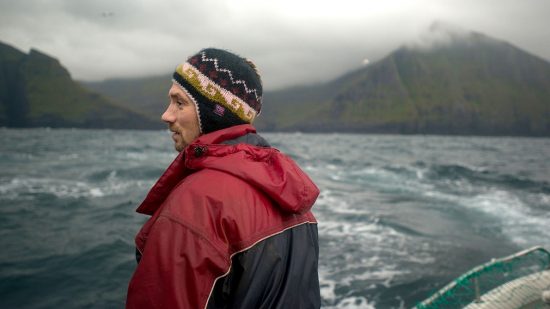Review: The Islands and the Whales
Asked if I know about the whale hunting that happens in the north seas, my reply would have always been the same as any individual who feels passionately about animal rights; an utterly scathing “I know enough.” After watching this documentary about the practice as it currently exists in the Faroe Islands, I confess myself eating my own words. In fact, I have never felt a keener affinity to Jon Snow in my life… I knew nothing.
Before you click away in disgust, let me say from the outset that I in no way condone whale hunting or the consumption of whale meat. But I have always prided myself in taking the time to educate myself about practices – both those I stand behind, and those I critique. Education is the only way we earn the right to pass comment or judgement; it is our greatest tool and this film is an invaluable educational asset. To understand any argument, we need to consider both sides, and as any good documentary should, The Whales and the Islands provides that other-side insight – not commenting on it, simply showing it.
The remote Faroes are a cluster of islands between Iceland and Scotland, at the point where the Norwegian Sea and North Atlantic Ocean meet. It is a place where life moves at a much slower pace than most everywhere else, and change is slower to take effect. A place where little grows, due to its inhospitable climate and the people who inhabit the islands live closer in line with their Viking hunter-gatherer forbearers than most other communities of the human population do in 2018.
This means locals still catch by hand and consume large amounts of seabirds and also pilot whales, the latter being a practice abhorrently condemned by the rest of the world. Against surely one of the most breathtakingly beautiful backdrops on the planet, captured brilliantly by filmmakers, one of the world’s most barbaric rituals takes place. While it is a key part of the film, it is not unnecessarily lingered on, merely depicted in the straightforward way it is carried out by locals.
The sequence is unquestionably upsetting to watch, but necessary. As we are made privy to conversations with various Island locals about the traditions and changing times, we learn that there is a movement opposing it coming from within, more for health reasons than any ethical question. It is easy to see that the conversation, when prompted within one’s own community, is stronger than anything outsiders could say, whose message fall on deaf ears.
We see the truth of this when foreign protestors arrive to protest the killings – one Pamela Anderson amongst their ranks. As observed by the older community, rather than making locals think twice about their practices, their intervention stirs and impassions the younger Faroese, “not because they care about hunting, but because another way of life is being forced on them.” Add to this the question of alternative food sources and the problems that they would give rise to, and it quickly becomes evident this is a more complex issue than we may have first thought.
This film tackles said complex issue head-on, opening it up for discussion in a way I have never seen done before and a way that requires a certain level of enterprise which I wish more filmmakers would employ. With regards to whale hunting, it doesn’t give us an answer, but it forces us to ask a question we hadn’t even considered before. As powerful as it is eye-opening, I would implore any person with feelings on this issue to give The Islands and the Whales the time of day.
THE ISLANDS AND THE WHALES is released in UK cinemas 29th March. You can find details of screenings here.











